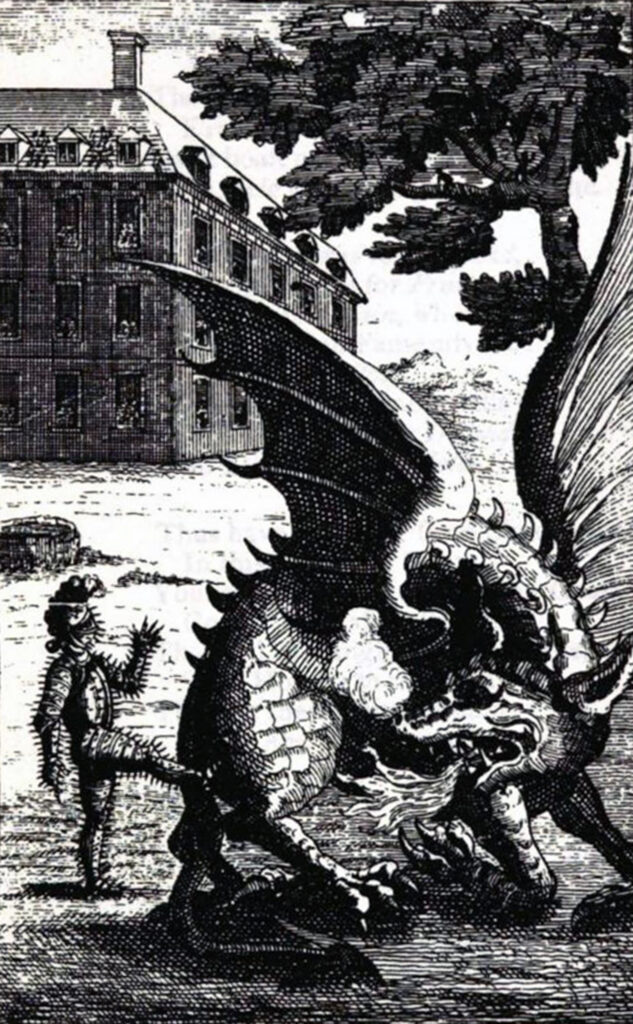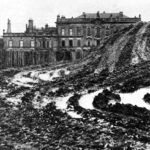25 July 1603: Sir Richard Wortley, persecutor of his neighbours, dies, and is zoomorphised as the protagonist of the ballad of the Dragon of Wantley

The Dragon of Wantley meets his doom, in an illustration to the work quoted below (Anon 1723).
Anon. 1723. An Excellent Ballad of a Most Dreadful Combat, Fought between Moore of Moore Hall, and the Dragon of Wantley. A Collection of Old Ballads. London: J. Roberts. Get it:
.Excerpt
At length the hard earth began for to quake, the dragon gave him such a knock,
Which made him to reel, and straight way he thought to lift him as high as a rock;
And thence let him fall, but More of More-Hall, like a valiant son of Mars;
As he came like a lout, so he turned him about, and hit him a kick on the arse.
Oh, quoth the dragon, with a sigh, and turned six times together,
Sobbing, and tearing, cursing and swearing out of his throat of leather.
Oh, thou rascal, More of More Hall, would I had seen you never,
With the thing at thy foot, thou hast pricked my arse-gut; oh, I am quite undone for ever.
Murder, murder, the dragon cried, alack, alack, for grief,
Had you but missed that place, you could have done me no mischief;
Then his head he shaked, trembled, and quacked, and down he laid, and cried;
First on one knee, then on back, tumbled he, so groaned, kicked, shit, and died.
Comment
Comment
David Hey provides a convincing explanation of the origins of the ballad. Richard Wortley held by lease the right to collect tithes at Wharnecliffe and/or Wortley (“Wantley” – the exact geography escapes me, for want of trying). However, his profits were increasingly limited by an old agreement that allowed the parishioners to pay a historically fixed sum instead of a percentage in kind. He had also increased his hunting land by means of enclosures. Tithes and enclosures were resisted, legally and illegally, by various individuals, of whom only George Blount of More Hall actively opposed Wortley in both. Wortley died in 1603 aged 42, and an older dragon tale may have been balladized to commemorate Blount’s vanquishing of this Dragon of Wantley (Hey 1993). Guides to the peerage say that Wortley died on 25 July, while all those to St. George’s Chapel, Windsor Castle, where Wortley was buried, agree that it was on 25 June.
Copyright prevents reproduction of the 1685 version of the ballad (Anon 1685) (a performance), the oldest known, but it’s virtually identical to this version. The ballad was extremely popular, and was turned into a comic opera in 1737 by librettist Henry Carey (Carey 1762) and composer John Frederick Lampe. Here’s the 2012 performance by Richmond Opera:
And so Richard Wortley will be remembered as the Dragon of Wantley, and not by the inscription on his tombstone (translation from the Latin):
Wortley, the grief and glory of his age,
Of people, king, and knights, the love and grace,
Here lies entombed; his loss his country grieves,
His loss the poor, to both his aid he gave;
When will truth, piety, and the sacred train
Of virtues, find so good, so great a man?
One like him’s found, but of female kind,
Unlike in sex, his wife’s the same in mind.
(Knight 1804)
Must also do something with the Conisbrough wyvern:
A grave slab of c1150 at Conisbrough, South Yorkshire. From left to right, foliage grows out of the mouth of a beast, a bishop or shepherd holds a crook, a knight with a sword and shield fights a dragon or wyvern. Possibly for William de Warrene, who died in 1147.
Conisbrough:… pic.twitter.com/6mdD0Bl95a
— Simon Knott (@SimoninSuffolk) October 14, 2024
Something to say? Get in touch
Original
1.
Old stories tell how Hercules
A dragon slew at Lerna,
With seven heads and fourteen eyes
To see and well discerna;
But he had a club, this dragon to drub,
Or he had ne’r don’t, I warrant ye
But More of More-Hall, with nothing at all,
He slew the dragon of Wantley.
2.
This dragon had two furious wings,
Each one upon each shoulder,
With a sting in his tail, as long as a flail,
Which made him bolder and bolder.
He had long claws, and in his jaws,
Four and forty teeth of iron,
With a hide as tough as any buff,
Which did him round environ.
3.
Have you not heard that the Trojan Horse,
Held seventy men in his belly?
This dragon was not quite so big,
But very near, I’ll tell ye,
Devour did he, poor children three,
That could not with him grapple;
And at one sup, he eat them up,
As one should eat an apple.
4.
All sorts of cattle this dragon did eat,
Some say he’d eat up trees,
And that the forest sure he would
Devour up by degrees.
For houses and churches, were to him geese and burches:
He eat all, and left none behind,
But some stones, dear Jack, which he could not crack,
Which on the hills you will find.
5.
In Yorkshire near fair Rotherham,
The place I know it well,
Some two or three miles, or thereabouts,
I vow I cannot tell;
But there is a hedge, just on the hill edge,
And Mathew’s house hard by it:
Oh there and then, was this dragon’s den,
You could not choose but spy it.
6.
Some say this dragon was a witch;
Some say he was the devil,
For from his nose, a smoke arose,
And with it burning snivel,
Which he cast off, when he did cough,
In a well, that he did stand by,
Which made it look, just like a brook,
Running with burning brandy.
7.
Hard by a furious knight there dwelt,
Of whom all towns did ring;
For he could wrestle, play at quarter-staff, kick, cuff, box, huff,
Call son of a whore: do any kind of thing;
By the tail, and the mane, with his hands twain,
He swung a horse till he was dead,
And that which was stranger, he for very anger,
Eat him all up but his head.
8.
These children as I told being eat,
Men, women, girls, and boys,
Sighing and sobbing, came to his lodging,
And made a hideous noise.
Oh save us all, More of More Hall,
Thou peerless knight of these woods;
Do but slay this dragon, we won’t leave us a rag on,
We’ll give thee all our goods.
9.
Tut, tut, quoth he, no goods I want,
But I want, I want insooth,
A fair maid of sixteen that’s brisk,
And smiles about the mouth:
Hair as black as a sloe, both above and below,
With a blush her cheeks adorning;
To ‘noint me o’re night, e’re I go to fight,
And to dress me in the morning.
10.
This being done, he did engage
To hew this dragon down;
But first he went new armour to
Bespeak, at Sheffield town,
With spikes all about, not within, but without,
Of steel so sharp and strong,
Both behind and before, arms, legs, all o’re,
Some five or six inches long.
11.
Had you but seen him in this dress,
How fierce he looked, and big,
You would have thought him for to be
An Egyptian porcupig:
He frighted all, cats, dogs, and all;
Each cow, each horse, and each hog,
For fear did flee, for they took him to be
Some strange outlandish hedgehog.
12.
To see this fight, all people there
Got upon trees and houses,
On churches some, and chimneys too;
But they put on their trowzes,
Not to spoil their hose. As soon as he rose,
To make him strong and mighty,
He drank, by the tale, six pots of ale,
And a quart of aqua vitae.
13.
It is not strength that always wins,
For wit doth strength excel,
Which made our cunning champion
Creep down into a well,
Where he did think this dragon would drink,
And so he did in truth;
And as he stooped low, he rose up and cried boe,
And hit him in the mouth.
14.
Oh, quoth the dragon, pox take you, come out,
Thou that disturb’st me in my drink,
And then he turned and shit at him,
Good lack, how he did stink:
Beshrew thy soul, thy body’s foul,
The dung smells not like balsam:
Thou son of a whore, thou stink’st so sore,
Sure thy diet it is unwholesome.
15.
Our politic knight, on the other side
Crept out upon the brink,
And gave the dragon such a doust,
He knew not what to think:
By cock, quoth he, say you so, do you see,
And then at him he let fly;
With hand and with foot, and so they went to’t,
And the word it was, Hey boys, hey.
16.
Your word, quoth the dragon, I don’t understand
Then to’t they fell at all,
Like two wild bears, so fierce I may
Compare great things with small:
Two days and a night, with this dragon did fight,
Our champion on the ground,
Tho’ their strength it was great, yet their skill it was neat.
They never had one wound.
17.
At length the hard earth began for to quake,
The dragon gave him such a knock,
Which made him to reel, and straight way he thought
To lift him as high as a rock;
And thence let him fall, but More of More-Hall,
Like a valiant son of Mars;
As he came like a lout, so he turned him about,
And hit him a kick on the arse.
18.
Oh, quoth the dragon, with a sigh,
And turned six times together,
Sobbing, and tearing, cursing and swearing
Out of his throat of leather.
Oh, thou rascal, More of More Hall,
Would I had seen you never,
With the thing at thy foot, thou hast pricked my arse gut;
Oh, I am quite undone for ever.
19.
Murder, murder, the dragon cried,
Alack, alack, for grief,
Had you but missed that place, you could
Have done me no mischief;
Then his head he shaked, trembled, and quacked,
And down he laid, and cried;
First on one knee, then on back, tumbled he,
So groaned, kicked, shit, and died.
1261 words.
Similar
 10 December 1769: Part of the northern ballad about Bill Brown, a Brightside (Sheffield) steelworker and hare-poacher killed by gamekeepers today near Rotherham
10 December 1769: Part of the northern ballad about Bill Brown, a Brightside (Sheffield) steelworker and hare-poacher killed by gamekeepers today near RotherhamSearch
Donate
Music & books
Place-People-Play: Childcare (and the Kazookestra) on the Headingley/Weetwood borders next to Meanwood Park.
Music from and about Yorkshire by Leeds's Singing Organ-Grinder.



 Bluesky
Bluesky Extwitter
Extwitter